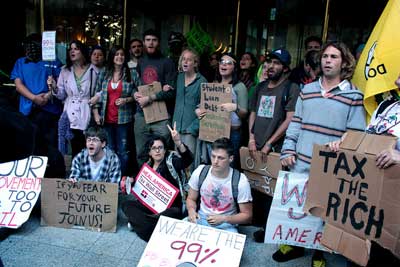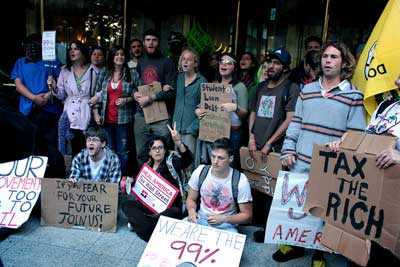
 Occupy Boston protesters demonstrating on October 5, 2011. Russia first warned the FBI of Boston Marathon bombing mastermind Tamerlan Tsarnaev in spring and later fall of 2011 – at the time, the FBI and Department of Homeland Security were actively monitoring Occupy Boston. (Photo: Ethan M. Long)Imagine if a band of violent criminals stormed a building, fatally shot several people and injured hundreds of others. What if the local police department was busy playing cards instead of stopping the bandits? Shouldn’t those irresponsible cops be held partially responsible for those casualties, if not lose their jobs altogether?
Occupy Boston protesters demonstrating on October 5, 2011. Russia first warned the FBI of Boston Marathon bombing mastermind Tamerlan Tsarnaev in spring and later fall of 2011 – at the time, the FBI and Department of Homeland Security were actively monitoring Occupy Boston. (Photo: Ethan M. Long)Imagine if a band of violent criminals stormed a building, fatally shot several people and injured hundreds of others. What if the local police department was busy playing cards instead of stopping the bandits? Shouldn’t those irresponsible cops be held partially responsible for those casualties, if not lose their jobs altogether?
Russia first warned the FBI of Boston Marathon bombing mastermind Tamerlan Tsarnaev in Spring of 2011, saying he had radical tendencies and could potentially stage a terror attack. Russian intelligence warned the feds again during the Fall of that same year. But in Boston, the FBI and Department of Homeland Security were busy monitoring something else in the Fall of 2011—Occupy Boston protesters.
The ACLU was able to obtain documents of intelligence reports filed in 2011. They reveal that on September 30, the DHS-funded Boston Regional Intelligence Center, or BRIC, was collecting information about an upcoming Occupy Boston rally in Dewey Square, just two days after Russia sent them the second warning about Tamerlan Tsarnaev. Boston Police Commissioner Ed Davis recently told Congress he “would have liked to know” that there was a potential extremist with violent intentions living in his city, and accused BRIC of failing to properly inform local law enforcement about a possible terrorist threat.
The DHS, which spent billions of dollars on fusion centers like BRIC, has been accused of gathering “crap intelligence” and using federal anti-terrorism programs and resources to spy on nonviolent protesters exercising their First Amendment rights, rather than stopping terrorists. When they should have been investigating Tamerlan Tsarnaev’s extremist ties, the intelligence arm of the Boston Police Department was busy collecting information on peaceful antiwar activists from Code PINK and Veterans for Peace. That information was assembled in dossiers categorized under “Criminal Act,” “Extremists,” “Civil Disturbance,” and the more disturbing “HomeSec- Domestic.”
In fact, monitoring the Occupy movement became DHS’ key focus in October of 2011, when the movement’s power and influence was at its peak. Among the topics included in the DHS’ daily intelligence briefing was “peaceful activist demonstrations.” That section was included in the same briefings as “significant criminal activity” and potential domestic terrorist acts.
In the days leading up to the Boston Marathon bombings, agencies were aware that the race’s finish line was “an area of increased vulnerability” and could be subject to domestic terrorism. Had Boston’s well-financed criminal intelligence prioritized actual domestic terrorists like Tamerlan Tsarnaev instead of nonviolent protesters, the warnings from Russia may have been taken seriously and the attack prevented.
This is all leading back to the troubling trend of the massive surveillance-industrial complex that’s cost us hundreds of billions of dollars since 9/11. It’s been recently revealed that federal agencies are likely reading our emails without a warrant, even though they’ve needed a warrant to read postal mail since the 19th century. One can only imagine how they’ve been misusing such unprecedented surveillance technology over the last decade.
When there’s so much sophisticated technology at the fingertips of our government to monitor everything we do, why couldn’t they stop one 26-year-old Chechen whom foreign governments had already warned us about twice before? Even though Boston Police locked down the entire city in a frantic search for Dzokhar Tsarnaev, forcing people from their homes at gunpoint with their hands raised like criminals, he may have evaded police were it not for the man who noticed Tsarnaev hiding in the boat parked in his backyard.
Now, in response to the bombings, cities everywhere are beefing up surveillance. But isn’t it far more likely that this technology will be used to curtail law-abiding citizens’ constitutional rights instead of deter terrorism?
This is a mishap with far greater scandalous implications than the hyped-up Benghazi talk of recent weeks, yet there’s nary a peep to be heard from the media on the tremendous failure of our government to prevent an attack that never should have taken place. This must be seen as a turning point for us to demand our rights back — particularly the First and Fourth Amendments — from a government that’s slowly been chipping away at them under the false pretenses of “national security.”
Like Benjamin Franklin said, those who would trade their liberty for a little security will lose both and deserve neither.
Join us in defending the truth before it’s too late
The future of independent journalism is uncertain, and the consequences of losing it are too grave to ignore. To ensure Truthout remains safe, strong, and free, we need to raise $50,000 in the next 9 days. Every dollar raised goes directly toward the costs of producing news you can trust.
Please give what you can — because by supporting us with a tax-deductible donation, you’re not just preserving a source of news, you’re helping to safeguard what’s left of our democracy.